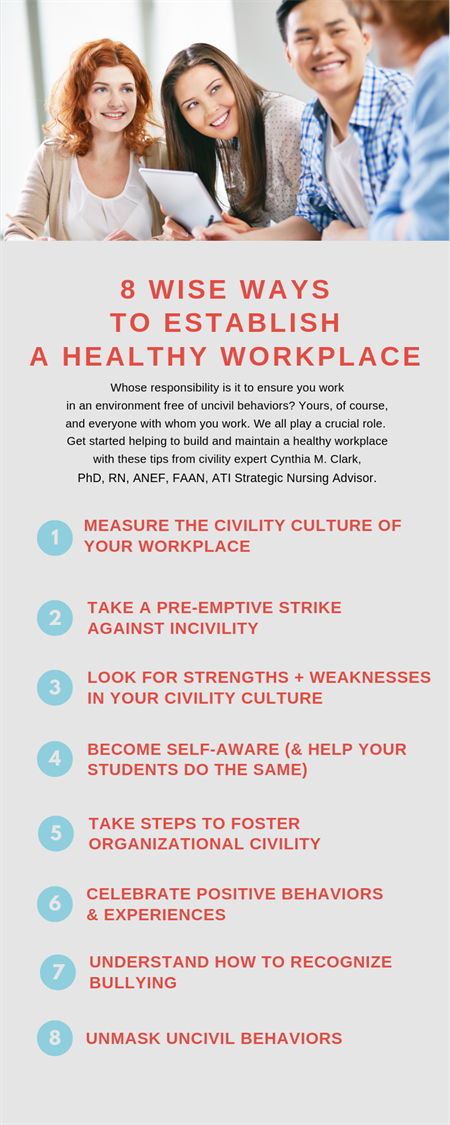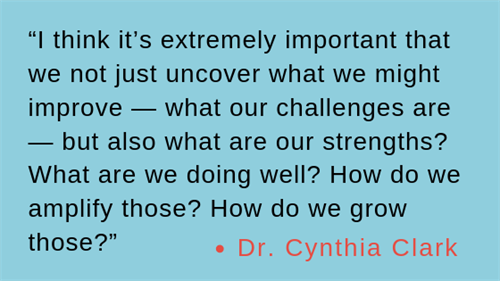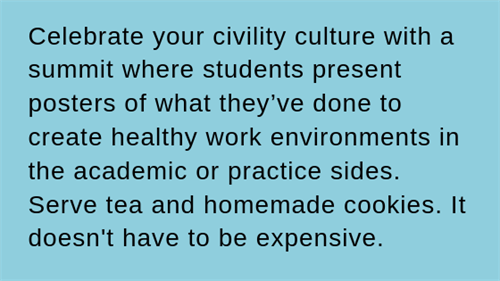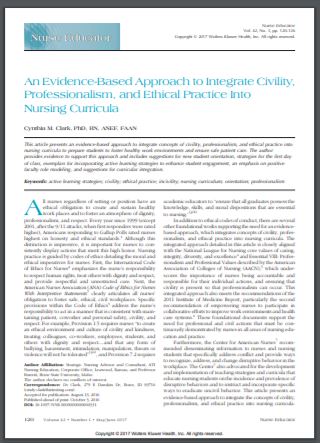8 Wise Ways to Establish a Healthy Workplace
1. MEASURE THE CIVILITY CULTURE OF YOUR WORKPLACE

If you’ve worked with — or currently work with — coworkers who don’t role-model the types of positive behaviors necessary for a healthy workplace, what can you do? How can all members of a workplace be held accountable for their actions — or lack of action when action is warranted? Dr. Clark recommends having some measurements in place.
“I don’t mean just the campus-climate surveys that so many of us complete in universities and colleges,” she explains. While these surveys are important, “I’m talking about something much more granular — about a measurement of the organizational culture of civility and respect within your program. You must look at, ‘What are the behaviors that are exhibited within this organization?’”
Questions you should ask include:
- How do we resolve conflict?
- How are we communicating — or not communicating — with one another?
- What are our strategies for relating with others?
- How do we conduct our faculty and committee meetings?
- How do we interact with colleagues and students?
“All of those answers need to be unpacked and examined,” Dr. Clark says. Once you do that, you’ll have the data to determine what issues to address.
That’s important, because, “in order to make effective change,” Dr. Clark explains, “we need to make data-driven, evidence-based decisions.”
Sometimes, the answers may reveal that the problem starts with the person in the top leadership position. But don’t give up hope if that’s the case at your program. “I’ve known situations where leaders have been identified as being ineffective,” Dr. Clark says, “and they have made excellent progress once they’ve seen the data, had their awareness raised, and committed to making positive change.”
2. TAKE A PRE-EMPTIVE STRIKE AGAINST INCIVILITY
Developing a culture of civility is at the heart of Dr. Clark’s next recommendation: Don't wait for uncivil events to occur. Instead, be preventive.
“A lot of my work is in primary prevention, or putting things in place that would pre-empt negative events from happening in the first place,” Dr. Clark says. To aid in that effort, she looks at whether a school has certain factors in place, such as:
- A vision
- A mission
- A set of shared values for which people are held accountable that are truly realized and aligned with creating campus cultures based on values of inclusion, diversity, civility, and respect.
“I’m talking about faculty staff, deans, directors — all of us in a school of nursing, including our students,” she adds. “I’ve worked with lots of organizations on crafting charters or honor codes or pledges where the individuals in the program make a commitment to interact respectfully with one another.”
Building in norms of conduct and behavior, she explains, ensures people are accountable for their behavior and words. “So, if I’m a faculty member, and there are norms in our school that say we treat one another with respect, including — and maybe as importantly — our students, and I’m not doing that, there should be some level of accountability, because I’ve made a commitment to that creed or that honor code,” she says.
“With coaching — with being open to feedback — great things can happen.”
3. LOOK FOR STRENGTHS IN ADDITION TO WEAKNESSES
 Finding the flaws in your program’s civility culture is important. But so is finding your program’s strengths.
Finding the flaws in your program’s civility culture is important. But so is finding your program’s strengths.
“I think it’s extremely important that we not just uncover what we might improve — what our challenges are — but also what are our strengths? What are we doing well? How do we amplify those? How do we grow those?” Dr. Clark says.
One valuable reason for this is that pointing out the positives ensures you don’t demoralize staff.
Another important point to keep in mind: Make sure you present areas for improvement in a positive way. You can say, “Here are some areas — based on evidence and data — that we might want to attend to,” Dr. Clark explains.
But don’t get too aggressive with your ambitions. “Don’t bite off more than you can chew,” she adds. “Pick two or three of the top issues to go after in an academic year, for example. Then, set some long-term goals. But, most importantly, pay close attention to what you’re doing well and right.”
4. BECOME SELF-AWARE (& HELP YOUR STUDENTS DO THE SAME)
 In her research, Dr. Clark says she’s discovered that, oftentimes, individuals aren't aware of how they come across to other people. To address this deficit, she developed some tools to enhance self-reflection skills. (You can learn about these tools in a recent article published in the Journal of Continuing Nursing Education.) She’s also integrated learning activities with students in which they are paired with a classmate and, after some weeks’ time, they participate in a self-reflection exercise to assess civility in themselves and their classmate. Then, she's helped them understand the reasons for the assessments and has coached the students to provide constructive feedback in a meaningful way.
In her research, Dr. Clark says she’s discovered that, oftentimes, individuals aren't aware of how they come across to other people. To address this deficit, she developed some tools to enhance self-reflection skills. (You can learn about these tools in a recent article published in the Journal of Continuing Nursing Education.) She’s also integrated learning activities with students in which they are paired with a classmate and, after some weeks’ time, they participate in a self-reflection exercise to assess civility in themselves and their classmate. Then, she's helped them understand the reasons for the assessments and has coached the students to provide constructive feedback in a meaningful way.
“Ultimately, there’s myriad reasons, but one of them is that, every single day, on the patient floor, or in the community setting, or in the school — wherever we find ourselves — there will be conflict,” she explains. “Being able to give and receive feedback in a respectful way is a highly valued skill, and every person needs to know how to do that,” she says.
As an educator, having the skill of self-awareness ensures you interact with students in an appropriate manner. But you can also use this skill for peer reviews or 360-evaluations of colleagues.
5. TAKE STEPS TO FOSTER ORGANIZATIONAL CIVILITY
In her book Creating and Sustaining Civility in Nursing Education (2017), Dr. Clark outlines an eight-step, evidence-based framework to assist organizational leaders and teams in fostering a healthy, productive workplace. She refers to it as the Pathway for Fostering Organizational Civility, and she provides an overview in an article she wrote for Reflections on Nursing Leadership.
The key aspects to transforming a program’s culture are:
- A shared vision
- A clear, logical strategic plan
- A pledge from the entire faculty of meeting your long-term goals
- Supportive, purposeful leadership.
“Every program’s experience is going to be different,” Dr. Clark says. “But the one thing they all have in common is that, when they follow the steps and work together toward their common goal, they discover that the opportunities for enhancing civility are limitless.”
6. CELEBRATE CIVILITY
 Recognizing when your program achieves successes is among the eight steps noted above. But it’s significant enough to earn a call-out of its own here.
Recognizing when your program achieves successes is among the eight steps noted above. But it’s significant enough to earn a call-out of its own here.
“Celebrations — big and small — with students especially, are so important,” Dr. Clark emphasizes. “I know people are on tight budgets. So I’m not talking about a huge event that’s going to cost a lot of money.” Instead, she suggests brainstorming how you can build in ways to celebrate your achievements.
“One example is to have a civility summit. Students present projects — maybe posters of what they’ve done to create healthy work environments in the academic or practice sides,” Dr. Clark explains. “And maybe you just serve tea and homemade cookies during the event. It’s really just a way to showcase your successes without spending a lot of money."
7. UNDERSTAND HOW TO RECOGNIZE BULLYING
Bullying is a term that’s become nearly viral in recent years as people recognize the long-term consequences of this negative behavior. But what exactly does bullying mean?
“There are various definitions,” Dr. Clark says. “The one I like to use comes from NIOSH and says bullying is a persistent, targeted type of behavior, usually with some power gradient that exists. So if I’m bullying someone, I’m going to target that individual — usually — to demean, demoralize, or marginalize him or her.”
Dr. Clark prefers the NIOSH definition, because it does not specify "intentionality." “We know that sometimes bullying occurs intentionally. But there are others who bully without intent. It’s often because it’s become ingrained behavior. It’s a technique that’s worked for them. They’ve gotten their way. It’s just how they roll,” she explains.
Intentional or not, bullying can have devastating effects. So it’s imperative that you know what it is — and stop it in its tracks when you encounter it.
8. UNMASK UNCIVIL BEHAVIORS
 If you discover you’ve overlooked unintentional bullying, you likely have missed even harder-to-spot nonverbal, uncivil behaviors.
If you discover you’ve overlooked unintentional bullying, you likely have missed even harder-to-spot nonverbal, uncivil behaviors.
Dr. Clark describes these less obvious acts in her paper “An Evidence-Based Approach to Integrate Civility, Professionalism, and Ethical Practice Into Nursing Curricula” (Nurse Educator, Vol. 42, No. 3, pp. 120-126).
“Acts of incivility may include nonverbal behaviors such as arm-crossing, eye-rolling, or refusing to listen and walking away or more overt behaviors such as making disparaging remarks, belittling others, or intentionally excluding and marginalizing others,” Dr. Clark writes. “Incivility also includes failing to take action when actions are warranted, such as withholding important information about a patient’s care, failing to intervene on another’s behalf, refusing to assist a colleague, or neglecting to acknowledge others.”
In the field of healthcare, such rude, disruptive behavior can have lasting and extremely harmful effects. Over time, they can result in psychological or physiological distress for the people involved. They can even lead to patient harm and death. Learning how to address these negative cues, however, is an achievable skill — and one you can help yourself and your students develop.
So, don’t give up if your program seems to need a tune-up. With proactive efforts, many nursing programs have successfully addressed and overcome uncivil workplaces. Dr. Clark has seen it happen. “I can assure you that your problems can be fixed,” she says. “You simply have to take those first steps. One day at a time, and you’ll once again be loving what you do — and all the people with whom you do it.”
Read more articles about civility:
- Q&A With Dr. Cynthia Clark on New Civility Mentor Simulations
- 10 Ways a Nurse Educator Can Contribute to a Civil, Productive Learning Environment
- 5 Significant Reasons for Including Civility in Nursing School Curricula
- 8 Wise Ways to Establish a Healthy Workplace
- Civility Can’t Improve Without Understanding These 5 Factors
LEARN MORE ABOUT CIVILITY MENTOR.

